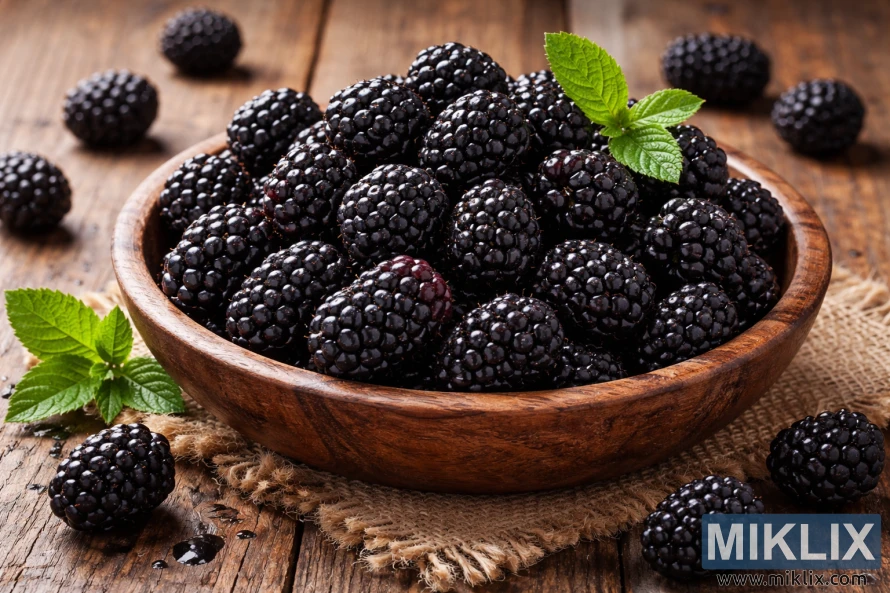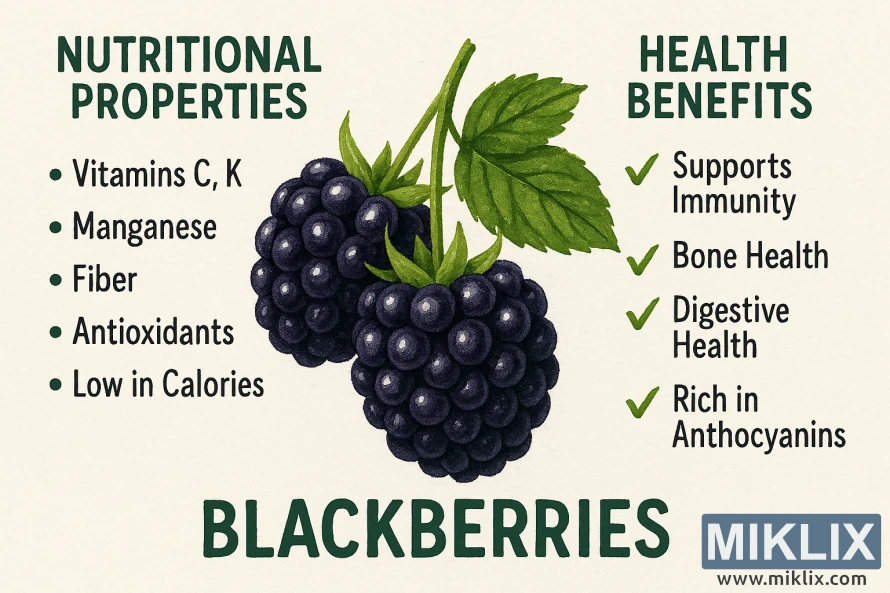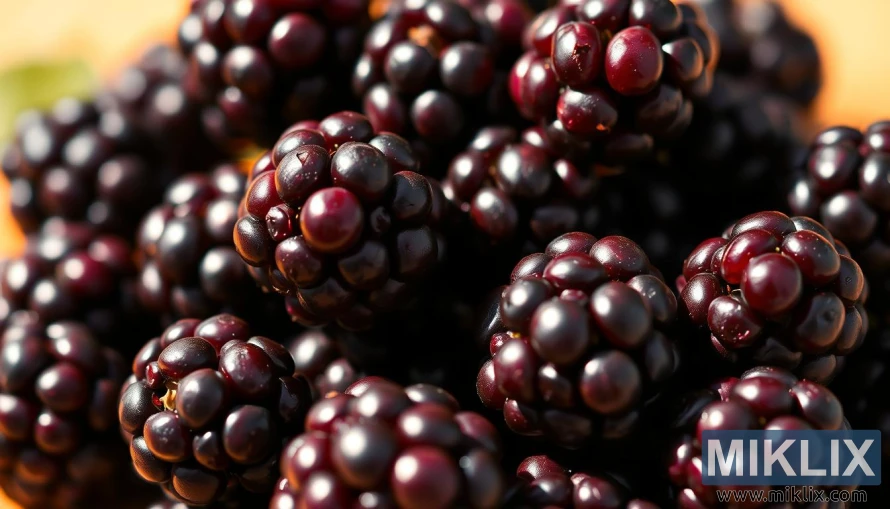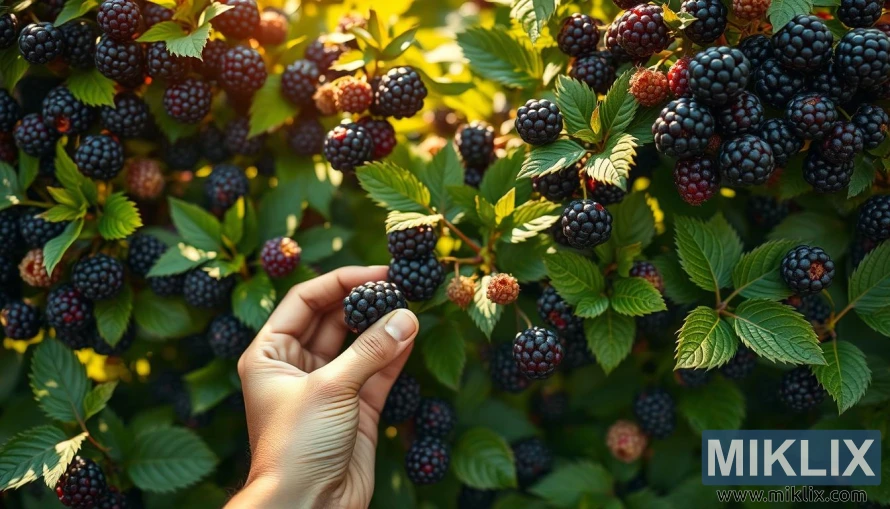Eat More Blackberries: Powerful Reasons to Add Them to Your Diet
Published: April 3, 2025 at 4:17:37 PM UTC
Last updated: January 2, 2026 at 5:59:28 PM UTC
Blackberries are more than just a tasty snack. They are a superfood loaded with nutrients. They are full of vitamins, minerals, and fiber. This makes them a great addition to your diet. These small berries are low in calories but high in antioxidants. They might help prevent diseases like cancer and heart disease. Let's explore how blackberries can boost your health.

Key Takeaways
- Blackberries are a nutrient-rich superfood.
- They are low in calories and carbohydrates.
- These berries are high in fiber and vitamins.
- Blackberries are known for their antioxidants and health benefits.
- Incorporating blackberries into your diet may enhance overall wellness.
Introduction to Blackberries
Blackberries are a sweet summer treat, now found in stores all year. They have a taste that's both sweet and a bit tart. Their juicy seeds, called drupelets, add to their flavor and nutritional value.
For centuries, blackberries have been used for their health benefits. Today, studies show they're good for you too. They're full of antioxidants, which fight off harmful stress and might lower disease risks.
Adding blackberries to your meals can boost your health. They're packed with nutrients that support well-being. Enjoying blackberries means you get to taste their deliciousness while benefiting from their health perks.
Nutritional Profile of Blackberries
Blackberries are packed with nutrients, making them great for a healthy diet. A one-cup serving of raw blackberries has about 62 calories and 14 grams of carbs. They also offer 8 grams of fiber, which helps with digestion and keeps you full.
These berries are full of vitamins like vitamin C and vitamin K. Vitamin C boosts your immune system. Vitamin K is key for strong bones. Blackberries are also rich in manganese, which helps with metabolism and fighting off free radicals.
The antioxidants in blackberries, like anthocyanins, fight oxidative stress. This makes them important for overall health. Knowing what's in blackberries shows how they can help keep your diet balanced and support your health in the long run.

Packed with Vitamin C
Blackberries are a tasty way to get more vitamin C. They have about 30.2 milligrams per cup. This is almost half of what adults need every day.
Vitamin C is key for making collagen. Collagen keeps our skin healthy and helps fix tissues. It also boosts our immune system, helping us fight off sicknesses.
Eating blackberries gives us antioxidants. These fight off harmful free radicals that can cause diseases. This might help prevent some cancers and keep us healthy.
Adding blackberries to your meals boosts vitamin C levels. They help us recover from illnesses. So, they're great for anyone looking to stay healthy.
High Fiber Content
Blackberries are a great source of dietary fiber, with about 8 grams per cup. This fiber is key for good digestive health. It helps lower cholesterol, manage blood sugar, and keeps you feeling full longer.
Many people don't get enough fiber, leading to constipation and heart disease risks. Adding blackberries to your diet is a tasty way to increase fiber. Enjoy them fresh, in smoothies, or with yogurt for extra nutrition.
Rich Source of Vitamin K
A cup of blackberries has almost 29 micrograms of vitamin K. This nutrient is key for blood clotting, stopping too much bleeding after injuries. It also helps with bone health, making bones strong and reducing fracture risks.
Eating blackberries can boost your vitamin K levels. This is great for keeping bones strong. If you're on blood thinners, talk to your doctor about how much vitamin K you should eat.
High in Manganese
Blackberries are packed with manganese, giving you about 0.9 milligrams per cup. This mineral is key for many body functions. It helps with bone health and metabolism.
Manganese is needed for enzymes that help make energy and collagen. It also helps antioxidants work right.
Eating blackberries can help keep your bones strong. Manganese stops osteoporosis, which makes bones weak. It also helps control blood sugar, which is good for metabolic health.

May Boost Brain Health
Research shows blackberries are great for brain health. They are full of antioxidants, like anthocyanins, which boost brain function. Eating blackberries often can help neurons talk better, making them good for your mind.
Blackberries also fight inflammation in the brain. This can help protect against memory loss as we age. For seniors, adding blackberries to meals might help prevent dementia.
Supports Oral and Dental Health
Blackberries are good for your mouth because they fight off bad bacteria. This can help prevent gum disease. Eating blackberries can make your mouth cleaner.
Studies show blackberry extract might help stop gum disease and cavities. Blackberries have special compounds that are good for your teeth. They are a tasty way to keep your teeth healthy.
Adding blackberries to your snacks or meals is good for your teeth. They also reduce inflammation in your mouth. This can help with gum problems and make your mouth feel better.
Potential Anti-Inflammatory Effects of Blackberries
Blackberries are not just tasty; they're also good for you. They're packed with polyphenols, like anthocyanins. These compounds might help fight inflammation in the body.
Inflammation is linked to serious health problems, like heart disease and diabetes. Adding blackberries to your meals could help lower these risks. This makes them a great choice for anyone looking to stay healthy.
Blackberries are a delicious way to cut down on body inflammation. This can be a big plus for your health. Eating them might help keep your body's inflammation levels in check, leading to better health over time.
May Aid in Cardiovascular Health
Adding blackberries to your meals can help your heart. These berries are full of anthocyanins, which are strong antioxidants. They might help lower inflammation and improve your cholesterol levels.
Studies show that these antioxidants can prevent atherosclerosis. This condition can lead to heart attacks and strokes. So, eating blackberries can be a great way to keep your heart healthy.
Blackberries are versatile and can be enjoyed in many ways. You can mix them into smoothies, add them to oatmeal, or just snack on them. They not only taste great but also support your heart health. This makes them a great addition to a healthy diet.
Potential Cancer Prevention Properties
Early studies suggest blackberries could help prevent cancer. They are full of antioxidants like flavonoids and anthocyanins. These compounds can slow down cancer cell growth.
Blackberries are rich in antioxidants that protect DNA from damage. This damage can lead to cancer. The berries' extracts can block harmful effects of certain drugs on colon cancer cells.
Research also shows blackberry extracts can lower telomerase activity in colon cancer cells. Telomerase helps cancer cells grow and live longer. Lowering this activity means blackberries might fight cancer in a new way.
Blackberries have a high antioxidant level. They can fight off harmful free radicals. Eating blackberries might help prevent cancer by reducing oxidative stress.

Blackberries and Weight Management
Blackberries are great for those trying to manage their weight. They have just 62 calories per cup, making them perfect for low-calorie snacks. This low calorie count makes it easy to add them to your diet without worrying about extra calories.
Blackberries are also packed with fiber. Fiber helps you feel full, which can lead to eating fewer calories. This is key for people trying to lose or maintain weight.
Another plus is their low glycemic index. This means they don't cause blood sugar spikes. For those watching their weight, adding blackberries to meals and snacks is a wise move.
How to Incorporate Blackberries into Your Diet
Blackberries are a tasty addition to any meal. They have a sweet-tart taste and are packed with nutrients. Here are some meal ideas to get you started.
- Add fresh blackberries to your morning smoothie for a burst of flavor and nutrition.
- Top your yogurt parfaits with blackberries, granola, and a drizzle of honey.
- Incorporate blackberries into salads, pairing them with spinach, goat cheese, and walnuts for a refreshing meal.
- Use blackberries in desserts such as cobblers or as a fresh topping for ice cream.
- Create savory blackberry recipes by making a tangy blackberry vinaigrette to drizzle over roasted vegetables.
These berries are great fresh, frozen, or in jam. They offer many health benefits. Adding blackberries to your diet is easy and fun.

Conclusion
Adding blackberries to your diet boosts flavor and health. These berries are full of vitamins, minerals, and antioxidants. They help with digestion and protect your heart.
They also might help prevent cancer. Enjoy them fresh, in smoothies, or desserts. This can greatly improve your health.
When picking fruits for your diet, remember blackberries' benefits. They're tasty and good for you, making them a great choice for a healthy life.
Further Reading
If you enjoyed this post, you may also like these suggestions:
- The Chondroitin Advantage: Natural Support for Joint Health and Mobility
- Unlocking Performance: How HMB Supplements Can Boost Your Strength, Recovery, and Muscle Health
- BCAA Breakdown: The Essential Supplement for Muscle Recovery and Performance
